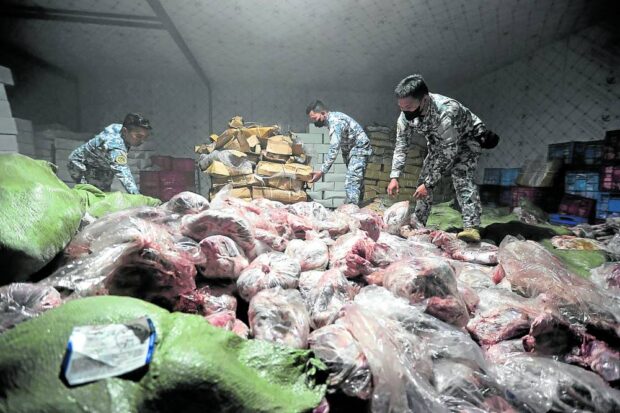
SMUGGLED AND ROTTING | A raid on two makeshift cold storage facilities in Meycauayan, Bulacan, on Tuesday, July 11, 2023, leads law enforcers to heaps of spoiled frozen meat, valued at P35 million, from Germany and India. The raid was led by the Department of Agriculture. Authorities say they found evidence that the meat shipment was being repacked to be sold despite its condition. (Photo by GRIG C. MONTEGRANDE / Philippine Daily Inquirer)
MANILA, Philippines — Smuggled frozen agricultural products valued at P35 million were confiscated during an operation in Meycauayan City in Bulacan, the Department of Agriculture (DA) reported on Tuesday.
“Several frozen spoiled meat products, including pork feet, lamb, and chicken skin, were found inside two makeshift cold storage facilities,” the DA said in a statement.
Local authorities said they discovered the banned frozen meat products from Germany and India, along with evidence of reboxing of the spoiled meat.
The agency said a thorough investigation is underway to dig deeper into the reboxing operations.
Bureau of Customs (BOC) Commissioner Bien Rubio said that when the letter of authority (LOA) was served, the owner of the warehouse was not around, prompting agents to ask a homeowners association (HOA) of the Meycauayan Industrial Subdivision to accompany the agents, along with two barangay officials.
P35 million-worth of spoiled meat products were seized by a composite team from the Bureau of Customs (BOC) and the Department of Agriculture (DA), in a warehouse at Meycauayan, Bulacan. DA officers present said it was deemed unfit for human consumption.
(Photo from the Bureau of Customs)
“Since the owners or building administrator were not present at the warehouse to serve the LOA, our team proceeded to the subdivision’s homeowners’ association to do substituted service of the LOA,” Rubio said.
According to BOC, a certain Richard Vasuno from the HOA’s administrative staff received the LOA.
Deputy Commissioner for Intelligence Group Juvymax Uy meanwhile said that the DA’s Inspectorate and Enforcement (DAIE) and the National Meat Inspection Service (NMIS) were present during the operation, and they declared the meat unsafe for humans.
“The DAIE and the NMIS also did initial evaluation of the meat products and, based on the physical appearance and foul odor, the said meat products are determined to be unfit for human consumption,” he furthered.
Agriculture Assistant Secretary James Layug said the storage warehouses would be shut down and its owners held accountable for trading smuggled agricultural commodities.
“The seized commodities lack the sanitary and phytosanitary clearance from the appropriate Food Safety Regulatory Agency (FSRA),” Layug said.
The DA will file charges against those involved for violating the Food Safety Act of 2013 and the Anti-Agricultural Smuggling Act of 2016.
Food safety remains one of its major concerns, the DA said, adding that selling smuggled meat and fishery products in the market poses a danger to public health.
The anti-agricultural smuggling law only covers sugar, corn, pork, poultry, garlic, onion, carrots, fish and cruciferous vegetables in a raw state, or which have undergone simple processes of preparation or preservation for the market.
On the other hand, the Food Safety Act aims to strengthen the food safety regulatory system in the country to protect the public from food-borne and water-borne illnesses and unsanitary, unwholesome, misbranded or adulterated foods, among others.